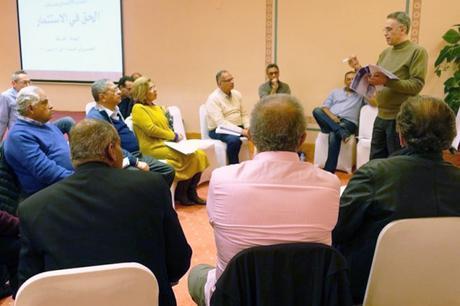
Sayed Diab makes his living providing sound systems and digital services for events like this CIPE discussion. (Photo: CIPE Egypt)
By Ahmed ElSawy
This post originally appeared in Arabic on the CIPE Arabia blog.
Sayed Diab spent 26 years of his life working as a technician supplying organizations with sound systems and related digital services for their events and conferences. Six years ago he started his own business in this field and has since made his living providing his services to CIPE, other NGOs, business associations, and think tanks in Cairo, Egypt.
Diab recently sat down for an interview about his experiences running his own business in Egypt and what he has learned as a small business owner from the many CIPE events and discussions he has worked on.
Although Diab says that he is too focused on ensuring the quality of his service, the accuracy of his sound, and the safety of his devices to give his full attention to all the events he works on, sometimes specific discussions attract his attention. He concentrates and listens to discussions which have a major impact on the development of many of his acquaintances, especially the topics related to business and economic affairs.
Diab notes that events on the development of SMEs, informality, access to finance, and preparing business plans have especially attracted his attention. He benefits greatly by listening to these discussions while doing his work, as it strengthens his knowledge and adds to his business experience, as well as helping him better market his business and understand how to work with government entities.
When Diab decided to start his own private business, from the beginning he committed to formalizing it by registering his company, issuing the commercial record and tax card, and fulfilling all other requirements set by the government. He didn’t hesitate to formalize because the majority of his business is with established entities, including the government and formal private sector who will only work with formal suppliers because they keep official records of all transactions, contracts, and invoices. Moreover, he was motivated by the safety and security of formalizing his business, as formal registration provides a degree of legal protection.
On the other hand, Diab has in some ways suffered by choosing to join the formal sector. One of the major challenges he faces concerns tax estimates, as he finds it difficult to report certain expenses because in many instances he has been forced to work with informal suppliers for either equipment rental or maintenance. These expenses are not reported because there are no invoices for them, but Diab still pays for them.
The government also perceives his business as a source of income by collecting various taxes and fees on all his services. It seems that the government chases the formal sector to pay a variety of taxes which hinders the growth of his business, especially given that his business is linked to growth in sectors, such as tourism, that have been highly affected since the Egyptian Revolution on the 25th January. At the time of a shrinking market, he didn’t find support from the government but, on the contrary, he felt the government depended on money collected from him and other small businesses to solve its problems.
Diab believes that informal sector businesses can be more dynamic and flexible because they do not face the same problems, thus presenting unfair competition while formalized businesses have the burden of paying taxes and other fees. This is one of the threats from the informal sector, because its lower prices create demand for its services and commodities. The competitiveness of the informal sector, according to Diab, is based primarily on its lower prices, often the most important variable in the market. However, he does not have this same advantage because he pays for the social insurance of 6 registered employees as well as taxes and other fees, all of which seems unfair to him.
In Egypt, fully 85 percent of small and medium enterprises employing about 10 million people are thought to operate informally, meaning they are not officially registered and are not subject to taxes or many other regulations. This puts a heavy burden on those small businesses, like Diab’s, that are formally registered.
Depending on such a narrow slice of the tax base to pay for all government expenses leads to substandard public services and discourages more businesses from registering. CIPE works with the business community in Egypt to advocate for policies that make it easier for informal businesses to move out of the shadows, enabling them to grow, access credit, hire workers, and use the legal system to enforce contracts and settle business disputes.
Ahmed ElSawy is an Egyptian journalist and writer.

